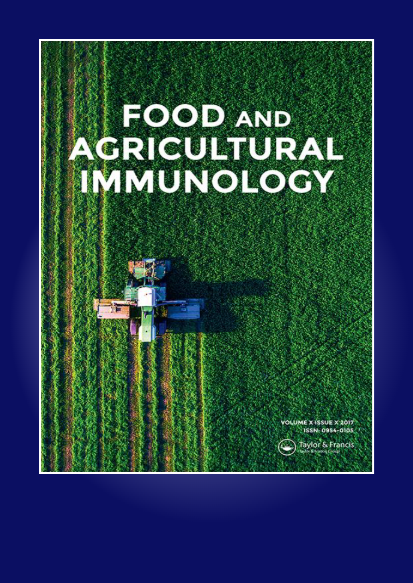Development of a specific monoclonal antibody-based icELISA for detection of arecoline in traditional Chinese medicines and fresh areca nuts
IF 2.1
3区 农林科学
Q3 CHEMISTRY, APPLIED
引用次数: 4
Abstract
ABSTRACT Arecoline, the dominant alkaloid existing in areca nuts, is an addictive substance and classified as a Group 2B potential human carcinogen. Currently, the detection of arecoline is mostly dependent on chromatography-based approaches, which are time-consuming and expensive. We used arecaidine as a hapten to produce a highly specific monoclonal antibody (mAb) against arecoline. An indirect competitive enzyme-linked immunosorbent assay (icELISA) was developed using the mAb-A5H12, to detect arecoline in traditional Chinese medicines and fresh areca nuts. The icELISA indicated that the half maximum inhibition concentration (IC50) for arecoline was 67.9 ng/mL, with a working range of 10.1–502.6 ng/mL and a limit of detection (LOD) of 3.6 ng/mL. High-performance liquid chromatographic (HPLC) confirmed the accuracy and the working range of icELISA, suggesting that the icELISA approach based on the arecoline specific antibody could be a widely applicable and easy operation method in detection of arecoline in foods and medicines.基于单克隆抗体的icELISA检测中药和新鲜槟榔果中槟榔碱的建立
槟榔碱是存在于槟榔果中的主要生物碱,是一种成瘾性物质,被列为2B类潜在人类致癌物。目前,槟榔碱的检测主要依赖于基于色谱的方法,这种方法耗时且昂贵。我们用槟榔碱作为半抗原制备了一种高特异性的槟榔碱单克隆抗体(mAb)。采用单克隆抗体- a5h12建立了一种间接竞争酶联免疫吸附试验(icELISA),用于检测中药和新鲜槟榔果中的槟榔碱。icELISA结果表明,槟榔碱的半数最大抑制浓度(IC50)为67.9 ng/mL,工作范围为10.1 ~ 502.6 ng/mL,检出限(LOD)为3.6 ng/mL。高效液相色谱(HPLC)证实了icELISA方法的准确性和工作范围,提示基于槟榔碱特异性抗体的icELISA方法在食品和药品中槟榔碱的检测中具有广泛的适用性和简便的操作方法。
本文章由计算机程序翻译,如有差异,请以英文原文为准。
求助全文
约1分钟内获得全文
求助全文
来源期刊

Food and Agricultural Immunology
农林科学-毒理学
CiteScore
5.30
自引率
6.70%
发文量
52
审稿时长
2 months
期刊介绍:
Food and Agricultural Immunology is an international open access journal publishing original immunological research with applications in food, agricultural, environmental and veterinary science. Submissions describing the use of immunological techniques and methods are particularly welcomed.
The journal aims to expand our understanding of the interactions at the interface of food and immune systems including studies on:
-Development of diagnostic systems – all types of ligand-based assays, e.g. antibody, aptamer
-Application of ligand-based assays for the detection or identification of molecules of interest in food science, agricultural research, veterinary investigations and clinical systems relating to food allergy or sensitivity to agricultural chemicals
-Effects of food on the immune system
-Studies on allergy and allergic reactions
-Investigations into food allergies
-Development of allergen-free food systems
-Development of novel assay formats
-Applications of assay systems to the monitoring of food items in relation to safety and labelling
-Food quality issues, e.g. speciation, adulteration and contamination
-Comparisons between different analytical techniques
The journal publishes research and review articles and is essential reading for food scientists, immunologists and all those concerned with the interaction between food and immune systems.
 求助内容:
求助内容: 应助结果提醒方式:
应助结果提醒方式:


